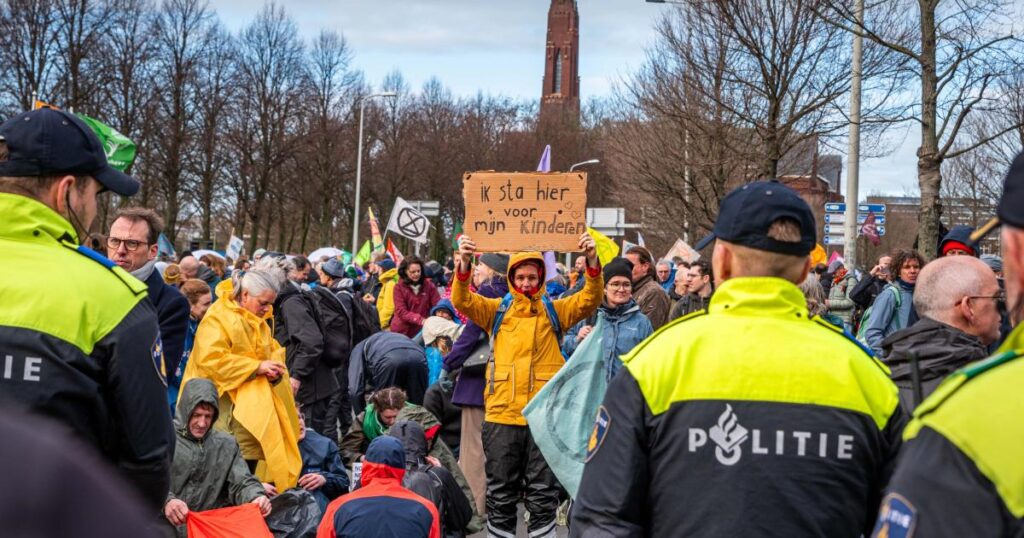A roadblock is changing Europe
7 min read
The A12 campaign was one of the climate movement’s biggest successes of 2023. Conducted by Extinction Rebellion Netherlands (XR NL), in partnership with dozens of allied groups including Greenpeace and Amnesty International, the campaign revolved around repeated occupations of the A12 highway in The Hague.
The objective was to stop the government from giving €40 billion a year in subsidies to fossil fuel companies. After an audacious escalation by XR NL from monthly to daily blockades, and with pronounced public support for this previously unheard-of demand, on 10 October 2023 the Dutch parliament conceded and commissioned a preliminary inquiry into the issue.
One month later, a shock election outcome redrew the political landscape, with the far-right’s Geert Wilders riding a wave of anti-immigrant sentiment to victory. In the wake of this upheaval, the interim government announced a de facto postponement of further action on subsidies. In response, XR NL are embarking upon a new round of A12 actions – and this time it’s part of something altogether bigger.
Tipping point
Sometimes fossil fuel regimes can seem immovable. But XR NL has recently appeared unstoppable.
The A12 campaign has somewhat meagre name-recognition in the Anglophone climate world. This likely owes a lot to the tragic timing of an age-defining horror starting just as XR NL’s members and friends would otherwise have been celebrating a win three years in the making on October 10.
This victory – inevitably provisional – was exciting in policy-impact terms, but possibly even more so in that it showcased the process of nonlinear success. What started as just two-dozen people saw literally exponential growth, reaching 25,000 in September 2023.
Alongside this was a more qualitative, affective form of momentum, whereby newly-enlisted ‘rebels’ could rapidly feel part of an exciting, inclusive and empowering common effort. Perhaps the most charismatic single product of this effervescent energy was the ‘A12 orchestra’, convening hundreds of musicians for roadside renditions.
Subtler, but more consequential, was how this positivity reflected in public perception of the blockades as annoying but defensible. A significant 80 per cent of a Dutch survey audience opposed the blockades – but this didn’t stop widespread outrage when the police staged dawn raids at activsts’ homes.
Avalanche
With the triumphant conclusion of September’s exhilarating and exhausting month-long blockade, XR NL exercised one of its ten core principles by following the action-cycle with a period of rest – often surprisingly difficult to implement in practice, this is an achievement in itself.
But in the new year, organisers have apparently had little difficulty in restoring their prior momentum. XR NL spokesperson Jelle de Graaf attests that 2023’s explosive growth in membership was not merely numerical: “A lot of people who attended in support are now well-integrated, willing to get arrested and running their own actions.”
This is reflected in a new proliferation of high-energy campaigns. The most direct offshoot is the A10 campaign outside Amsterdam, conducted by the A12’s original organising team and this time targeting ING’s bankrolling of ecocidal infrastructure – part of an XR-wide turn towards financial institutions.
Another parallel is the emergent Stop Nieuw Fossiel campaign, which has twice descended on a major intersection outside an energy firm in Utrecht, alongside various more targeted disruptions. Other fronts in this tumult of actions include large-scale disruptions of private airports in Eindhoven and Beek, and a blockade of Europe’s largest oil refinery as part of a six-nation action against North Sea Oil.
All of these major actions have happened in the last few months, in tandem with innumerable smaller-scale local actions which, according to Jelle, are occurring at an average rate of more than one per day.
This remarkable proliferation has posed the question of whether the returning A12 roadblocks can or should resume their old role as a national focal point. “It’s an ongoing discussion”, says Jelle. “We’re going to see how it goes.”
On the road
The first of this new season of A12 blockades took place on 3 February. Being an A12 aficionado, I got on a ferry to see it first-hand.
On one hand, the event was evidently re-finding its feet after September’s climactic intensity: this was not the culmination of a long process so much as the beginning of a new one – all reflected in the grey late-winter weather.
Veterans and newcomers like myself wondered if the police and news-outlets might respond differently. Many of those I spoke to were taking direct action for the first time, inspired by what they’d seen in September, and did not conceal their nervousness.
On the other hand, these newcomers were evidence of a burgeoning movement. The preceding three weeks had seen almost daily action training events offered all over the country, informing newcomers both about XR’s action plan, but also its deep commitment to nonviolence and other cultural cornerstones.
At the appointed time, a few thousand of us poured onto the road. The sense of cautious excitement was palpable. When faced with an advancing police line, affinity groups sat down in the road, establishing the usual stand-off conditions.
The A12 orchestra gave a powerful performance, followed by speeches. As the third speaker paid tribute to friends lost in Gaza, police rushed in and confiscated the PA system, arresting those who’d spoken.
This marked a shift in tone. As we’d been warned in trainings, the police produced a water cannon which dripped menacingly but remained unused. Defiant chants sprang up.
Also as warned, police began manhandling seated protestors onto reappropriated public buses, for removal en-masse. As further warned, they threatened the use of ‘proportionate violence’ to get us to comply.
I’ll admit, though: when my turn came to be removed, I was surprised to find myself on the receiving end of said violence for no greater reason than my noncompliance. And I was astonished how much it hurt – pain more brutal and consuming than any other I’ve experienced – the more so for being so deliberately applied by fellow humans.
It turned out this was a distinctive feature of the day. Though far from universal, it appears that officers made use noticeably greater use of ‘proportionate violence’ than previously, encompassing pain-holds far more vicious than mine, suffocation, and finding highest expression in the intentional breaking of a man’s ribs on both sides.
Storm clouds
I ask Jelle if the mood on the streets is different after the far-right’s wins in the elections. “Very much”, he affirms.
The new parliament’s convoluted process of government-formation is far from concluded, so for now no new legislation is being made. But three of the four parties mooted to govern as a right-wing coalition have publicly stated their interest in clamping down on people who “misuse the right to protest”.
Jelle predicts that when the new government finally forms, “after immigration laws, laws targeting the right to protest will be next”. “And”, he adds wryly, “they’re not talking about the farmers”. Indeed, one of the parties set to rule is the Farmer-Citizen Movement, which channelled farmers’ discontent into a culture war around the ‘green agenda’ – a scepticism very much shared by Wilders and his far-right friends.
So far as it can, XR NL is preparing for such changes. “The biggest defence we have is that we’re a very open organisation, which makes it very hard to target us for anything. So far all police repression against XR in the Netherlands has backfired massively”.
But this sort of anti-fragility is hardly guaranteed: Jelle cites the UK as one of the more worrying examples of “a level of repression which really can de-motivate people”.
On the road again
The group’s latest blockade on April 6 saw further escalation of repression: a vigorous police deployment including horses meant XR NL’s crowds were unable to set foot on the A12 at all. In a familiar story, the rebels’ response was to resort to ‘guerilla’ tactics, with smaller groups enacting unpredictable blockades.
This less predictable approach may in turn give some explanation – though no justification – for Dutch police’s further reliance on violence. An official XR NL source attests “Once again there was a lot of police brutality”.
One of the victims was Greta Thunberg. Despite her 4’11 stature and patent peacefulness, one of the officers arresting her nonetheless saw fit to apply the same controversial bokkepootje or ‘goat feet’ hold that I’d experienced in February.
Thunberg’s presence and treatment has brought attention to this month’s blockade – something that might relieve its organisers, given a somewhat disappointing lack of growth in attendance and a halving in the tally of arrests – from 800 in February to 400 in April.
Continental
Perhaps the biggest news from the weekend’s action, however, was the announcement of “a major international campaign against fossil subsidies”.
Climate groups in other countries have emulated many aspects of the A12 campaign since October – but the most common, and most unifying, has been the foregrounding of fossil fuel subsidies. With this announcement, XR NL has taken an important step towards coalescing that shared struggle into something more coordinated.
The most advanced A12 emulations to date have been in Berlin and Brussels, both of which have already seen several anti-subsidy blockades. Both of these A12-esques have previously been boosted by delegations from their Dutch counterparts – but XR NL’s latest announcement promises that “buses will leave from all over the Netherlands for Brussels” for that city’s next blockade on May 4. They also plug a plan from German group Letzte Generation to protest simultaneously in 18 different cities.
XR NL’s announcement underscored this increased internationalism with the claim that actions were happening at that moment in eight other European countries. Admittedly only one of these – Brussels – was a full-fledged blockade, with others mostly symbolic. The symbolism is nonetheless significant.
After XR NL’s victory in October, the Dutch Parliament’s primary excuse for inaction on fossil subsidies was that the practice is too international in scale for any single government to meaningfully change. It seems the energy unleashed on the A12 is rising to that challenge: the EU elections in June are now the target of a growing European anti-subsidies campaign.
This Author
Douglas Rogers is a writer, activist, and editor of Raveller magazine.





